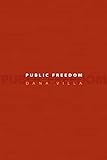Public Freedom / Dana Villa.
Material type: TextPublisher: Princeton, NJ : Princeton University Press, [2008]Copyright date: ©2008Edition: Course BookDescription: 1 online resourceContent type:
TextPublisher: Princeton, NJ : Princeton University Press, [2008]Copyright date: ©2008Edition: Course BookDescription: 1 online resourceContent type: - 9780691135946
- 9781400837427
- 320.011
- JC585
- online - DeGruyter
- Issued also in print.
| Item type | Current library | Call number | URL | Status | Notes | Barcode | |
|---|---|---|---|---|---|---|---|
 eBook
eBook
|
Biblioteca "Angelicum" Pont. Univ. S.Tommaso d'Aquino Nuvola online | online - DeGruyter (Browse shelf(Opens below)) | Online access | Not for loan (Accesso limitato) | Accesso per gli utenti autorizzati / Access for authorized users | (dgr)9781400837427 |
Browsing Biblioteca "Angelicum" Pont. Univ. S.Tommaso d'Aquino shelves, Shelving location: Nuvola online Close shelf browser (Hides shelf browser)

|

|

|

|

|

|

|
||
| online - DeGruyter Old Masters and Young Geniuses : The Two Life Cycles of Artistic Creativity / | online - DeGruyter On War / | online - DeGruyter Paying the Tab : The Costs and Benefits of Alcohol Control / | online - DeGruyter Public Freedom / | online - DeGruyter Race in Another America : The Significance of Skin Color in Brazil / | online - DeGruyter Reviving the Invisible Hand : The Case for Classical Liberalism in the Twenty-first Century / | online - DeGruyter Schooling Islam : The Culture and Politics of Modern Muslim Education / |
Frontmatter -- Contents -- Acknowledgments -- 1 Introduction: Public Freedom Today -- 2 Tocqueville and Civil Society -- 3 Hegel, Tocqueville, and "Individualism" -- 4 Tocqueville and Arendt: Public Freedom, Plurality, and the Preconditions of Liberty -- 5 Maturity, Paternalism, and Democratic Education in J. S. Mill -- 6 The Frankfurt School and the Public Sphere -- 7 Genealogies of Total Domination: Arendt, Adorno, and Auschwitz -- 8 Foucault and the Dystopian Public -- 9 Arendt and Heidegger, Again -- 10 The "Autonomy of the Political" -- Notes -- Index
restricted access online access with authorization star
http://purl.org/coar/access_right/c_16ec
The freedom to take part in civic life--whether in the exercise of one's right to vote or congregate and protest--has become increasingly less important to Americans than individual rights and liberties. In Public Freedom, renowned political theorist Dana Villa argues that political freedom is essential to both the preservation of constitutional government and the very substance of American democracy itself. Through intense close readings of theorists such as Hegel, Tocqueville, Mill, Adorno, Arendt, and Foucault, Villa diagnoses the key causes of our democratic discontent and offers solutions to preserve at least some of our democratic hopes. He demonstrates how Americans' preoccupation with a market-based conception of freedom--that is, the personal freedom to choose among different material, moral, and vocational goods--has led to the gradual erosion of meaningful public participation in politics as well as diminished interest in the health of the public realm itself. Villa critically examines, among other topics, the promise and limits of civil society and associational life as sources of democratic renewal; the effects of mass media on the public arena; and the problematic but still necessary ideas of civic competence and democratic maturity. Public Freedom is a passionate and insightful defense of political liberties at a moment in America's history when such freedoms are very much at risk.
Issued also in print.
Mode of access: Internet via World Wide Web.
In English.
Description based on online resource; title from PDF title page (publisher's Web site, viewed 08. Jul 2019)


